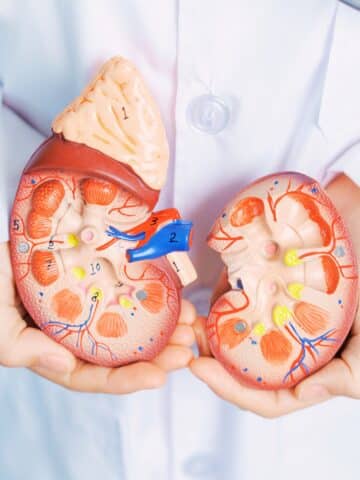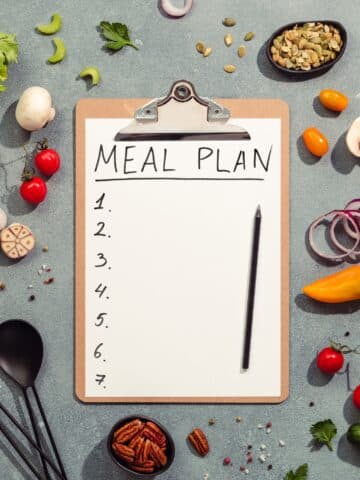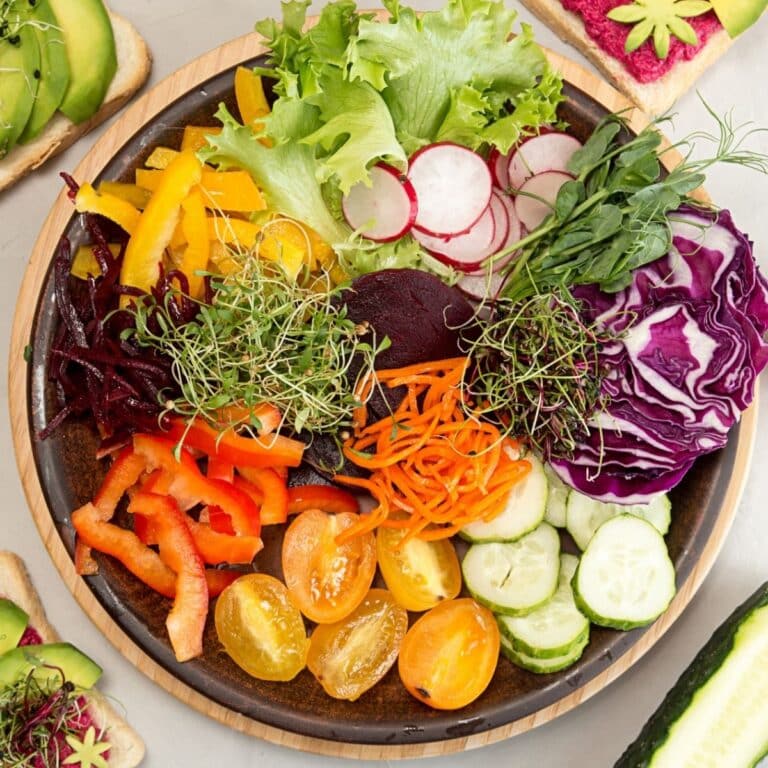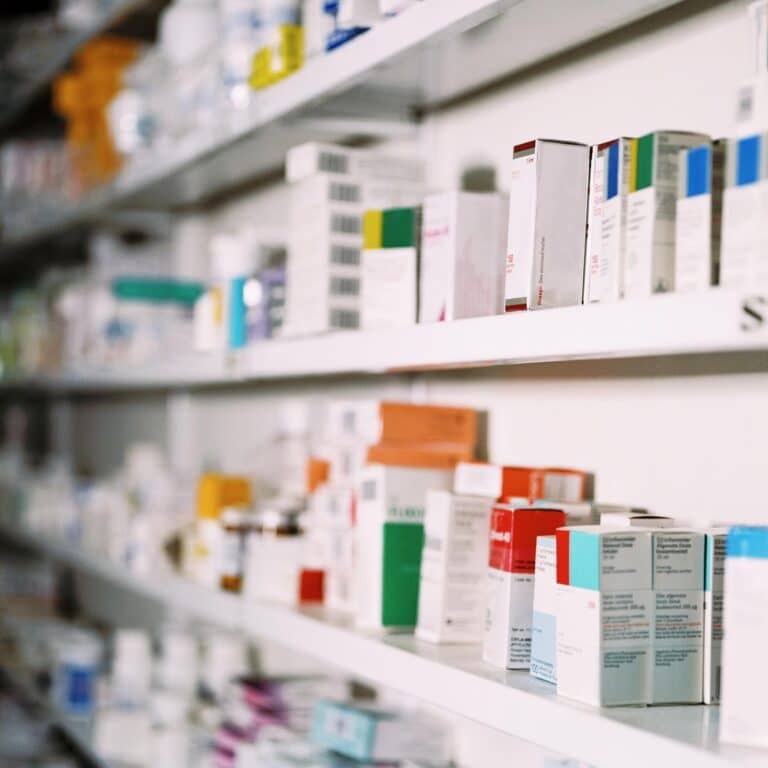Processed Foods To Avoid With Chronic Kidney Disease
In the United States, it is very commonplace for people to eat a diet that is high in processed foods.
Grocery stores typically have far more processed foods than healthier whole foods. If you need ideas for healthy comprehensive healthy renal diet grocery list guide.
People eat processed foods because they taste good, they are easy, and because they are often cheap.
These benefits may seem enough, but the cost of eating processed foods is costing many people their health.
Especially for those people with chronic health conditions like kidney disease, eating processed foods can affect your health in the worst ways.

This guide will help you understand the impact of processed foods on chronic kidney disease and identify which processed foods to avoid and what healthier alternatives you can embrace.
Let's journey together towards better renal health.
Jump to:
- Key Takeaways
- What Makes Up Processed Foods
- Understanding the Role of Processed Foods in Kidney Disease
- The Hidden Dangers of Dark-Colored Sodas
- The Risks of High Sodium in Canned Foods
- Processed Meats: A Hidden Threat to Kidney Health
- The Unseen Risks of Consuming Dried Fruits
- Chocolate's Impact on Chronic Kidney Disease
- The Effect of Dairy and Dairy Alternatives on Kidney Health
- FAQs for Processed Foods
- Avoid Processed Foods With Kidney Disease
Key Takeaways
- Canned foods with high sodium content can be detrimental to renal health
- High sodium, phosphorus, and other components in processed foods worsen kidney problems
- Packaged snacks and alcohol can harm renal health
- Dark-colored sodas with phosphorus additives exacerbate chronic kidney disease symptoms
For More Recipes and Ideas --->> Get Your Free Meals and Recipes That Are Perfect for Pre-Dialysis Diets, Pre-Dialysis with Diabetes, or Dialysis Diets.
What Makes Up Processed Foods
Chemically Processed
Many people do not understand what “processed” means when it comes to food. Unless you are eating fresh produce, your food is likely processed in some way. It might have been ground or milled, macerated, or mixed with other ingredients. This is not the type of processing that can be dangerously unhealthy.
The kind of processing that you have to look out for is chemically processed foods. These foods have tons of added ingredients, mostly chemicals that act as preservatives, color additives, sweeteners, and more.
Just look at the back of the box under the ingredient list. You may notice a whole lot of words that most people could not begin to pronounce, much less understand. Some of these are foods you would be better off avoiding (foods to avoid with kidney disease).
Low Nutritional Value
The nutrition label may or may not divulge just how nutritionally barren processed foods really are. Learn about reading nutrition facts labels with CKD.
Many may even tout that they are high in fiber, vitamins, and minerals. The truth is, however, that the chemicals, hidden ingredients, and other “bad stuff” may simply negate any real nutritional value.
Hidden Ingredients
The majority of processed foods can include a lot of hidden ingredients that you may find appalling, or just downright disgusting.
Cellulose is a popular filler ingredient that is made from cotton or wood pulp.
Worse still, some ingredients in popular processed foods (reducing processed foods) are just chemicals that can have adverse effects on your body.
Unhealthy Additives
On top of a huge list of hidden ingredients and chemicals, processed foods are also full of added sugars, which can have true consequences for people with health issues like chronic kidney disease and diabetes.
High blood sugar levels can damage vessels and filtering units in your kidneys, contributing to kidney disease.
Processed foods can even ruin the healthier ingredients by processing them too much, which can effectively destroy vitamins and minerals.
Especially if you are already living with certain chronic health conditions, such as chronic kidney disease, cutting out as much processed foods can be very beneficial to your health.
Processed foods are a big part of why so many Americans are overweight and sick.
A diet full of real, whole foods such as fruits and vegetables and whole grains, can help you live a much healthier life and help to slow the progression of your chronic kidney disease.
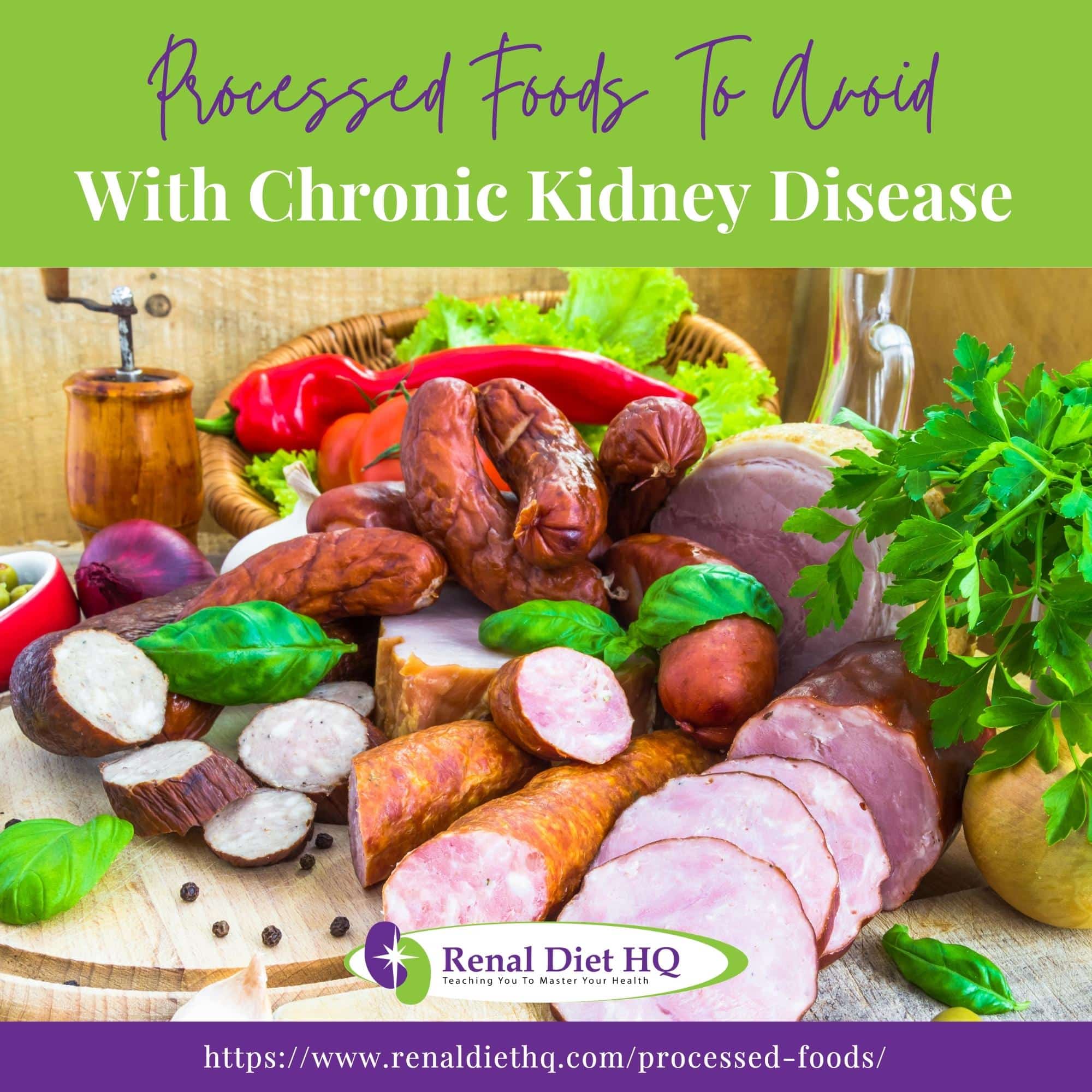
Understanding the Role of Processed Foods in Kidney Disease
Processed foods can also contain a high amount of sodium, phosphorus, and other components that worsen kidney problems.
In addition to these components, processed foods are often low in fiber, vitamins, and minerals. This means that processed foods can lead to issues such as anemia, a common problem with chronic kidney disease. Understanding kidney disease and anemia is vital.
By avoiding processed foods, you can help to reduce your risk of worsening renal health and improve your overall quality of life.
Impact of Sodium
It's important to understand that processed foods can have a significant impact on the progression of chronic kidney disease.
The toxicity of these foods, laden with sodium, can cause hypertension, which damages the blood vessels inside your kidneys.
Dietary adjustments are essential. Opting for kidney-friendly snacks instead of processed ones is a crucial step towards preserving your renal health.
Embracing renal-friendly spices like turmeric and ginger can add flavor while minimizing sodium.
Avoiding Harmful Ingredients
Steering clear of harmful ingredients in what we eat is a must-do, especially when it comes to maintaining good renal health. Your care for others and their well-being should include helping them understand the impact of certain foods on kidney health.
- Artificial Sweeteners Impact: Large amounts of certain sweeteners can lead to kidney damage over time. Instead, opt for natural sweeteners like honey.
- Frozen Meals Dangers: They often contain high levels of sodium which can strain kidneys. Encourage fresh, home-made meals.
- Trans Fats Risks: Trans fats trigger hypertension, which damages the kidneys. Promote heart-healthy fats instead.
Don't forget about the effects of alcohol consumption and packaged snacks concerns too! These all add up to create a healthier lifestyle that supports good renal health.
The Hidden Dangers of Dark-Colored Sodas
You might not realize it, but your go-to dark-colored soft drinks (soda and kidneys) could also be having a significant impact on your kidney health. These popular beverages often contain phosphorus additives, which can disrupt a careful kidney diet.
Let's delve into how these hidden ingredients in your favorite soda may influence the balance of nutrients vital for preventing renal function decline over time.
Phosphorus Additives in Sodas
Phosphorus can't be properly filtered by damaged kidneys, exacerbating chronic kidney disease. High phosphorus levels caused by phosphorus additives can lead to bone and heart problems in people with kidney disease.
You must understand the critical role of phosphorus regulation and find soda alternatives to support your renal health.
| High-Phosphorus Beverages To Avoid | Alternative Beverage Options |
| Dark-Colored Sodas | Water |
| Pepper type soda (Dr Pepper) | Coffee or tea |
| Chocolate drinks | Apple juice or cranberry juice |
Incorporating these beverage alternatives into a renal diet isn't only beneficial for overall health, but it also helps in managing phosphorus levels effectively.
Read beverage labels carefully to identify phosphorus additives. Some phosphorus additives to look out for are phosphoric acid, dicalcium phosphate, disodium phosphate, and monosodium phosphate.
Reducing phosphorus intake (low phosphorus foods) is vital to prevent decrease in kidney function. Remember, you're not just helping yourself but also paving the way for others suffering from similar conditions by raising awareness about the link between soda consumption and kidney health.
The Risks of High Sodium in Canned Foods
You might be surprised to learn about the high sodium content lurking in your pantry, particularly in canned types of food. It's not just a matter of taste - these hidden amounts of salt can have serious effects on your health, especially if you're managing kidney disease.
Let's delve into why it's so crucial for your renal health to understand and monitor the sodium content in these convenient, yet potentially risky, food items. Check out these salt substitute for kidney patients.
Sodium Content in Canned Foods
It's important to note that canned foods often contain a high level of sodium, which can be detrimental for those with chronic kidney disease.
Sodium's role in canned food is essential as a preservative but the impact on renal health can be severe.
Excess sodium intake can have negative impacts on your overall health, particularly on blood pressure and heart health.
Additionally, maintaining a low-sodium diet aids in kidney stone prevention; high sodium levels can also increase calcium in urine, contributing to kidney stones.
Develop strategies for reducing sodium intake, like choosing fresh or frozen options over canned foods, or selecting low-sodium varieties.
Always check labels for sodium content. They can be confusing so you need to know what to look for.
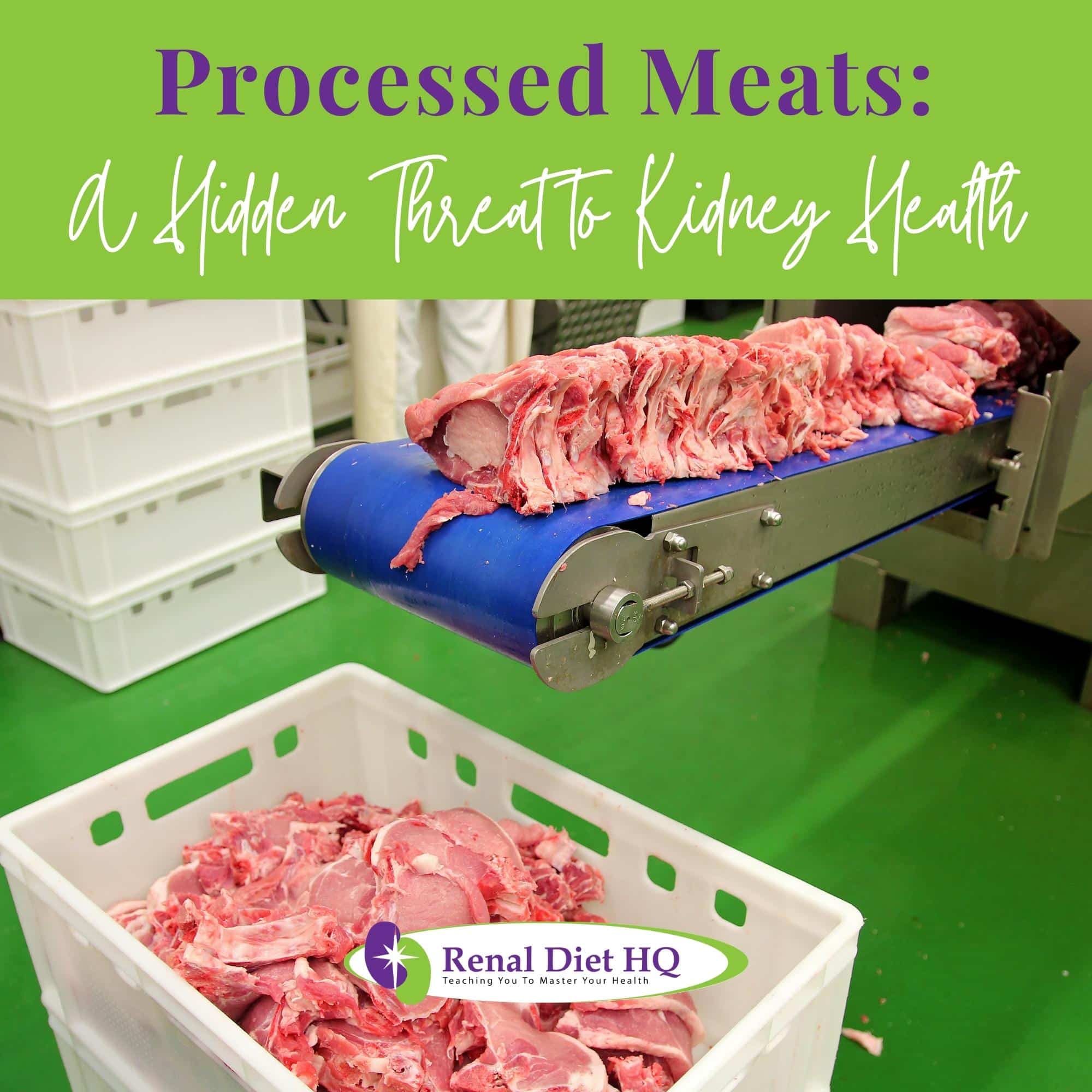
Processed Meats: A Hidden Threat to Kidney Health
You've likely heard that processed meats aren't exactly the healthiest choice. But do you know how their phosphorus content can impact your kidney health?
Many processed meats contain phosphorus additives, which are used to improve texture and extend shelf life.
But don't worry, there's no need to give up on your love for sandwiches or breakfast sausages. We'll explore some healthy alternatives to processed meats that are kinder to your kidneys.
Alternatives to Processed Meats
Now that you understand the high phosphorus content in processed meats, let's explore healthier alternatives. Consider incorporating plant-based proteins into your diet. These can provide essential nutrients without the added phosphorus found in processed foods:
- Fresh Poultry: Skinless chicken can be a lean protein alternative to processed meats. It contains less phosphorus compared to other meats like beef and pork. However, it's important to note that poultry with added seasonings or sauces may have higher phosphorus content, so opt for lean cuts without additives.
- Fish: Many types of fish are low in phosphorus and can be suitable for kidney patients in moderation. Examples include salmon, tilapia, and tuna. Fresh or frozen fish is generally a healthier choice than processed fish products like fish sticks or fish patties, which may contain additives.
- Legumes: Black beans, navy beans, and chickpeas are excellent plant-based protein sources that are low in phosphorus. They are versatile and can be used in various dishes like soups, stews, salads, and veggie burgers.
- Egg Whites: Can you eat eggs on a renal diet? Egg whites are a good source of protein and are naturally low in phosphorus. They can be prepared in different ways, such as boiled, scrambled, or as an ingredient in recipes.
The Unseen Risks of Consuming Dried Fruits
You've probably heard that dried fruits can be a healthy snack, but when it comes to your kidney health, you need to be aware of their high potassium levels.
It's crucial that you understand the importance of control of food intake when incorporating these nutrient-dense snacks into your diet. Too much potassium intake (low potassium diet) can put an extra burden on your kidneys, potentially exacerbating renal problems.
High Potassium
Avoiding foods high in potassium is essential when managing chronic kidney disease. Your kidneys play a crucial role in regulating potassium and maintaining its balance. When they aren't functioning properly, these minerals can build up in your blood, causing health complications.
Dietary approaches are an effective way to manage mineral levels. Consider swapping out high-potassium fruits like bananas for lower options such as apples or berries.
Potassium binders could help too, but always consult your healthcare provider before starting them.
And remember, creativity isn't limited with kidney-friendly recipes. There's a wealth of delicious options that'll support your renal health while keeping your taste buds happy!
Portion Control Importance
Portion control is particularly important for individuals with chronic kidney disease and when it comes to consuming processed foods.
Portion control helps regulate the intake of nutrients, such as sodium, potassium, and phosphorus, which can be harmful if consumed in excess for kidney disease patients.
Processed foods, such as canned soups, deli meats, and packaged snacks, often contain high amounts of sodium. Excessive sodium intake can lead to fluid retention and increased blood pressure, which can be detrimental to individuals with kidney disease. By practicing portion control, kidney disease patients can limit their sodium intake and better manage their blood pressure.
Processed foods may also contain high levels of phosphorus and potassium, which can be problematic for individuals with kidney disease. Excessive intake of these minerals can disrupt the balance in the body and contribute to complications. Portion control helps limit the consumption of processed foods, reducing the intake of phosphorus and potassium.
It's important for people with kidney disease to work with a registered dietitian who can provide personalized guidance on portion sizes and food choices. They can help tailor portion control strategies to meet the specific needs and restrictions of each individual with kidney disease.
Chocolate's Impact on Chronic Kidney Disease
You might love indulging in your favorite chocolate treat (chocolate for kidney patients), but have you considered its phosphorus and potassium levels?
These elements can be harmful if you're managing chronic kidney disease, as they could exacerbate your condition due to their potential to impose additional strain on your kidneys.
Don't worry, though, there are viable alternatives to chocolate that allow you a sweet fix without jeopardizing your renal health.
Chocolate's Phosphorus and Potassium
Chocolate's high levels of phosphorus and potassium can be problematic for those with chronic kidney disease.
However, don't despair entirely on cocoa benefits. Dark chocolate myths aside, it does contain antioxidants and flavonoids beneficial for preventing cardiovascular disease. But remember moderation is key due to its high content of phosphorus and potassium.
When diagnosed with kidney disease, it's important you're aware of these nuances regarding chocolate consumption. Take the time to know the facts about Chronic Kidney Disease.
Alternatives to Chocolate Consumption
For patients on a kidney diet, it's important to manage their intake of certain nutrients like phosphorus, potassium, and sodium. While chocolate is a delicious treat, it can be problematic for individuals with kidney disease due to its phosphorus and potassium content. Here are some alternative treats that can be enjoyed in moderation on a healthy diet:
- Carob: Carob is a natural, caffeine-free alternative to chocolate. It has a similar taste and can be used in baking or enjoyed as carob chips or bars. Carob is lower in phosphorus and potassium compared to chocolate, making it a suitable alternative for renal patients.
- Vanilla-flavored desserts: Opt for vanilla-flavored desserts such as vanilla pudding or custard. These can be made using low-phosphorus non-dairy milk and sweetened with a sugar substitute if needed.
- Fruit-based desserts: Fresh fruits can be a healthy and delicious option for satisfying a sweet tooth. Consider making fruit salads, fruit parfaits with low-phosphorus yogurt, or baked fruits with a sprinkle of cinnamon.
- Sorbet: Sorbet is a frozen dessert made with fruit juice or puree. It is typically lower in phosphorus and potassium compared to traditional ice cream. Look for sorbet options that are lower in added sugars.
- Rice cakes or rice crispy treats: Plain rice cakes or homemade rice crispy treats (using low-phosphorus cereal) can be a crunchy and low-phosphorus alternative to chocolate bars or cookies.
- Gelatin desserts: Gelatin desserts, such as sugar-free gelatin or jelly, can be a refreshing and low-phosphorus option for a sweet treat. Just be mindful of any additional fruits or toppings added, as they may contain higher levels of potassium.
Remember, moderation is key when indulging in any treats or desserts on a kidney diet. It's always best to consult with a registered dietitian who specializes in kidney disease to ensure that your dietary choices align with your specific dietary restrictions.
The Effect of Dairy and Dairy Alternatives on Kidney Health
You've probably asked yourself, "What's the real impact of dairy on my kidneys?"
In our next discussion, we'll dive deep into how dairy products can affect renal health, particularly if you're managing a kidney condition.
We won't stop there though, we'll also evaluate dairy alternatives and their potential benefits or drawbacks for your kidneys.
Dairy's Impact on Kidneys
While it's often considered healthy, dairy can actually have a negative impact on your kidneys if you're dealing with chronic kidney disease. High levels of phosphorus found in most dairy products may lead to complications if not properly processed by diseased kidneys.
Some dairy products, such as processed cheeses (kidney friendly cheese) and cottage cheese, can be high in sodium. Sodium intake increase can raise blood pressure and strain the kidneys, potentially leading to kidney damage over time.
In such cases, non-dairy milk drinks like almond milk or rice milk might be safer alternatives to keep your body nourished without straining your kidneys.
Evaluating Dairy Alternatives
It's crucial to evaluate dairy alternatives (dairy products and kidney disease) such as almond milk or soy products, which can provide the necessary nutrients without the potential harm to your kidneys.
Let's delve into almond milk benefits first. It's low in phosphorus and potassium, making it kidney-friendly.
Rice milk evaluation also reveals a safer choice due to its low protein and potassium content but may come loaded with sugar.
However, be vigilant with soy milk risks. Despite its protein content, it contains a higher level of potassium that may strain your kidneys.
Lastly, coconut milk impact also needs consideration; while tasty, it carries high potassium content.
Select wisely for optimal renal health!
Benefits of Following a Kidney-Friendly Diet
Following a kidney-friendly diet can have great benefits for kidney health.
A well-planned kidney-friendly diet ensures that individuals receive adequate nutrition while managing the restrictions and recommendations specific to kidney disease. This can help maintain overall health and well-being.
A kidney-friendly diet can help slow down the progression of kidney disease by reducing the workload on the kidneys. This can help prevent decline of kidney function and delay the need for dialysis or transplantation.
High blood pressure is a common among kidney patients. A kidney-friendly diet emphasizes reducing your sodium intake, which can help you lower blood pressure levels and protect your kidneys from further damage.
Kidney disease can disrupt the balance of electrolytes in the body. A kidney-friendly diet provides guidelines for managing the intake of potassium, phosphorus, and other electrolytes, helping to maintain their proper balance and prevent complications.
Kidney disease can affect the body's ability to maintain proper bone health. A kidney-friendly diet includes recommendations for phosphorus intake, along with considerations for vitamin D supplementation, to help prevent bone disease.
Kidney disease can impair the kidneys' ability to regulate fluid levels in the body. By following a kidney-friendly diet, individuals can limit excess fluid intake and prevent fluid overload, which can lead to swelling and other complications. Avoiding extra fluid may be particularly important for patients with severe loss of kidney function, as in end-stage renal disease and kidney failure.
It's important to note that the specific dietary recommendations may vary depending on an individual's stage of kidney disease and other factors. Consulting with a registered dietitian experienced in renal nutrition is recommended for personalized dietary guidance.
A well-planned kidney-friendly diet ensures that individuals receive adequate nutrition while managing the restrictions and recommendations specific to kidney disease. This can help maintain overall health and well-being.
Lastly, don't underestimate stress management techniques. Chronic stress can negatively affect the performance of kidneys over time. Practicing mindfulness or engaging in light exercise can help keep stress levels at bay while nurturing your overall mental well-being, all crucial steps towards healthy kidneys.
FAQs for Processed Foods
You can improve your kidney health by embracing kidney-friendly recipes, like meals high in fresh fruits and vegetables.
Organic food benefits include less sodium and artificial additives that stress kidneys.
Consider homemade meal planning to control the ingredients better.
Kidney-friendly snacks, such as fruits and veggies, are great alternatives to processed foods (kidney friendly fruits).
Consider vegetarian options for protein sources; they're easier on the kidneys.
Don't forget the importance of hydration, but mind your fluid balance as per your doctor's advice.
It's not just about avoiding processed foods, but consciously choosing healthier options for your well being.
One of the best ways for individuals with chronic kidney disease to ensure they are getting proper nutrition while avoiding processed foods is to make meal planning a priority.
Meal planning can help you control your dietary intake, allowing you to make sure that your meals are packed with fresh fruits and vegetables, whole grains, lean proteins, and other healthy foods.
Your kidney dietitian can recommend kidney-friendly recipes and provide advice on how to make healthy meal plans. Your dietitian can also help you identify any nutritional gaps in your diet that need to be addressed.
While it is generally recommended for individuals with chronic kidney disease to limit their consumption of processed foods, there are some processed food options that can be considered relatively safe and suitable for individuals with kidney disease.
It is important to note that dietary recommendations may vary based on the stage of kidney disease, other chronic diseases, and individual needs. Here are a few examples of processed foods that can be included in a kidney-friendly diet:
1. Low-sodium canned vegetables: Look for canned vegetables that are labeled as low-sodium or no-salt-added. These can be a convenient option when fresh vegetables are not readily available. However, it's still important to rinse them before consumption to reduce the sodium content further.
2. Frozen fruits and vegetables: Frozen fruits and vegetables can retain their nutritional value and may be a good alternative when fresh produce is not accessible. Choose options without added sugars or sauces.
3. Whole grain bread and pasta: Look for whole grain bread and pasta (pasta and kidney disease) options that are lower in sodium and phosphorus. These can be included in moderation as part of a balanced kidney-friendly diet.
4. Nut butters: Natural nut butters, such as almond or peanut butter without added table salt or sugar, can be a good source of healthy fats. However, it's important to be mindful of portion sizes due to their protein content. What about the best peanut butter for renal diet?
It's worth mentioning that even with these options, it's important to read food labels carefully, paying attention to sodium, phosphorus, and potassium intake. Additionally, homemade meals using fresh, whole ingredients are generally the best choice for individuals with kidney disease to have more control over their nutrient intake.
It is highly recommended to consult with a healthcare professional or a registered dietitian who specializes in kidney disease to develop an individualized meal plan that takes into account specific dietary restrictions, stage of kidney disease, and other health considerations. They can provide personalized guidance and help ensure that processed foods are incorporated in a way that supports kidney health.
While one or two drinks can be safe for kidney patients, excessive drinking can cause many problems to your kidney health. It induces dehydration, straining your kidneys as they work to balance bodily fluids. Additionally, alcohol raises blood pressure, worsening hypertension common in kidney disease sufferers.
Notably, the toxins in alcohol pose an excessive burden on already weakened kidneys. Therefore, just like with certain processed foods, it'd be best to limit or completely avoid alcohol intake for the sake of your renal health.
Absolutely, lifestyle changes can significantly improve kidney health in those with chronic kidney disease.
Incorporating exercises, managing stress effectively, and understanding the importance of hydration can all help (fluids to hydrate with kidney disorder).
It's also crucial to utilize meal planning strategies to ensure you're getting the right nutrients without overloading your kidneys.
Avoid Processed Foods With Kidney Disease
So, you've learned a lot about how processed foods can affect your kidney health. Dark soft drinks, canned goods, frozen meals, and processed meats all fall into this category (renal diet meat portion control).
It's crucial to be mindful of what you're consuming. Always remember that a diet low in sodium and processed foods is key to keeping your kidneys healthy.
Stay strong in your fight against chronic kidney disease!


